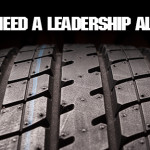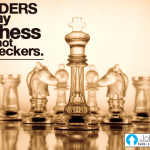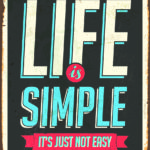
As I was rereading Dale Carnegie’s book, “How To Win Friends And Influence People” I remembered this story that he wrote about…
Bob Hoover, a famous test pilot and frequent per-former at air shows, was returning to his home in Los Angeles from an air show in San Diego. As described in the magazine Flight Operations, at three hundred feet in the air, both engines suddenly stopped. By deft maneuvering he managed to land the plane, but it was badly damaged although nobody was hurt.
Hoover’s first act after the emergency landing was to inspect the airplane’s fuel. Just as he suspected, the World War II propeller plane he had been flying had been fueled with jet fuel rather than gasoline.
Upon returning to the airport, he asked to see the mechanic who had serviced his airplane. The young man was sick with the agony of his mistake. Tears streamed down his face as Hoover approached. He had just caused the loss of a very expensive plane and could have caused the loss of three lives as well.
You can imagine Hoover’s anger. One could anticipate the tongue-lashing that this proud and precise pilot would unleash for that carelessness. But Hoover didn’t scold the mechanic; he didn’t even criticize him. Instead, he put his big arm around the man’s shoulder and said, “To show you I’m sure that you’ll never do this again, I want you to service my F-51 tomorrow.”
How do you treat the people you lead? More specifically, how do you treat them when they make mistakes? The truth is, everyone makes mistakes. Your team has either made some before or they will soon! How do you respond to their mistakes as a leader? If I were to ask you on a scale from 1-10 how well you handle mistakes from others what would you rate yourself at? Now think about this…what would your team rate you at? Is there a difference in the numbers?
Your perception and others can be very different when it comes to your attitude. You may feel calm and collected when others have made mistakes, but does your team see you that way? A leader has to evaluate how well they are able to handle team members that mess up. Bob Hoover had a handle on his attitude and turned what could have been a justified lashing into an opportunity to make lasting change. I bet the young mechanic that Hoover put his arm around changed for the better from that point on because of that experience. Hoover could have shattered the young man’s pride and courage to continue on. Hoover still got the point across to never let the mistake happen again, but he did it in a way to salvage a young man’s future.
The challenge you and I have as leaders is to make sure we handle others mistakes with the proper attitude. Never sacrifice a relationship because of a bad attitude or unbridled anger. Here are a few things to think about when others make mistakes…
1. Take A Deep Breath
Don’t get caught up in the emotion of the moment. Many times leaders say and do things they have to go back and apologize for because they were upset and quickly reacted. Don’t be a reactive leader be a proactive leader. Reactive leaders are controlled by the moment, proactive leaders are controlled by their values and character. Don’t let anger and frustration ruin an opportunity for change.
2. Sandwich The Correction
Always sandwich rebuke and correction with positive reinforcement and encouragement. Never just address the mistake and move on. Make sure to acknowledge what the person may be dealing with. Mistakes make others feel embarrassed, upset, angry, frustrated, unworthy, depressed, etc… Make sure you have positive things to say about the situation even if it is hard to find it. Use the opportunity to lift someone up not just tear them down.
3. Follow Up
After a confrontation or correction with a team member make sure you follow up a few days or maybe even weeks later with them. Let me know you have moved on and are expecting great things from them. Many people feel their leader is watching over them waiting for them to mess up again. Be the kind of leader that catches people doing things right, not just catching them doing things wrong. Follow up with reinforcement about their abilities and strengths.






Please note: I reserve the right to delete comments that are offensive or off-topic.